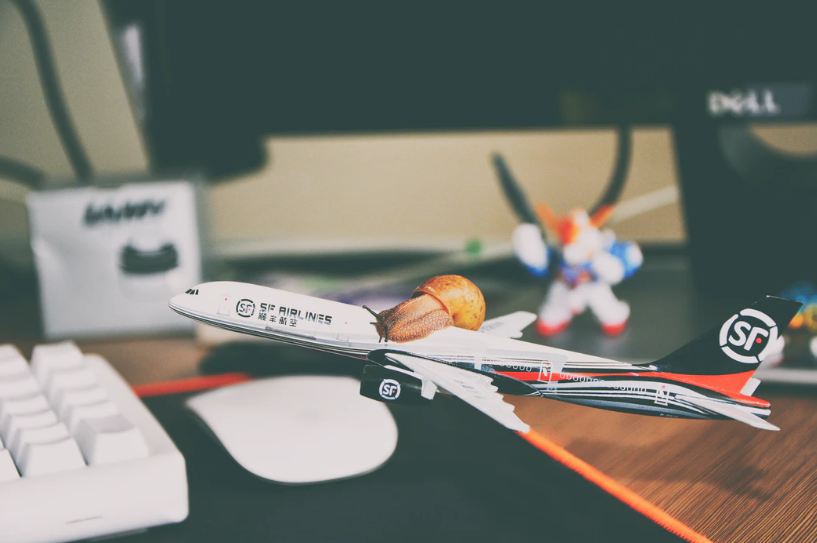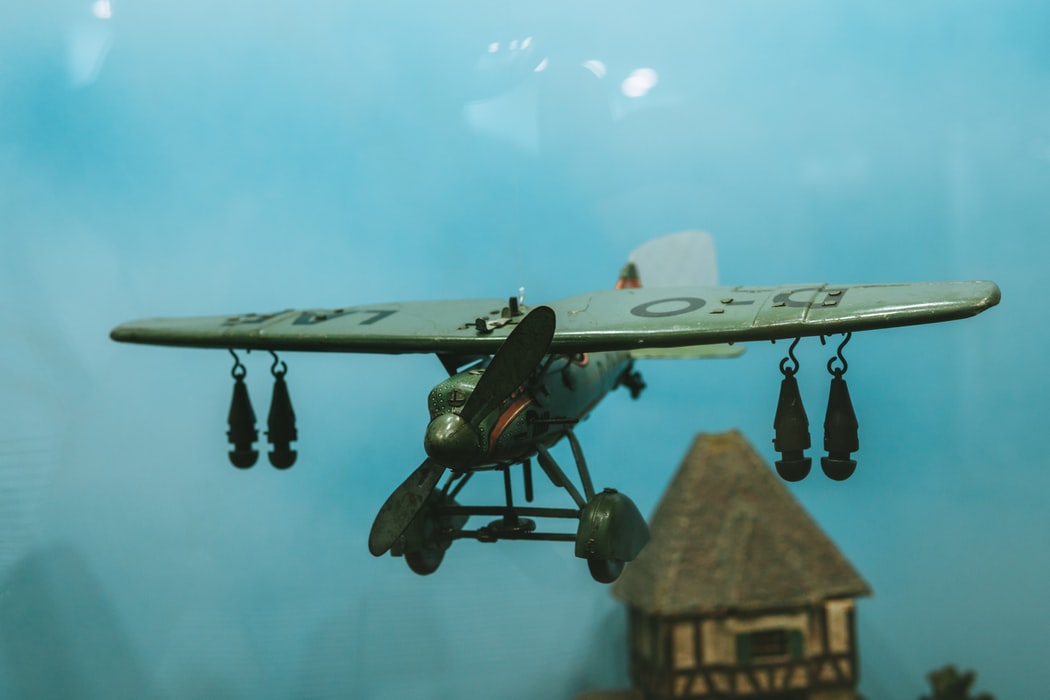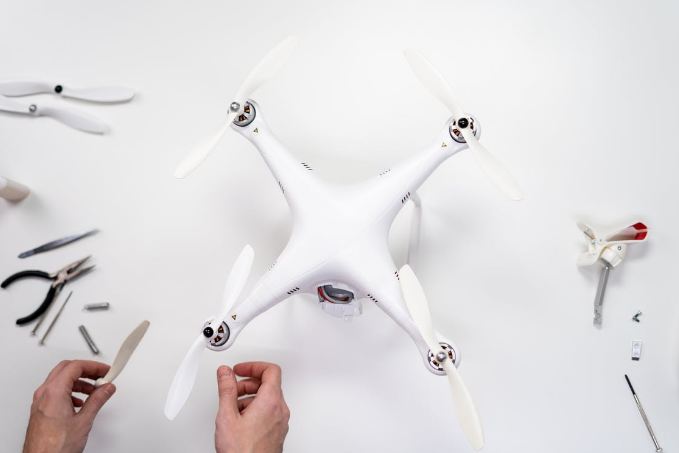Tips for Choosing Between a Drone or an RC Plane
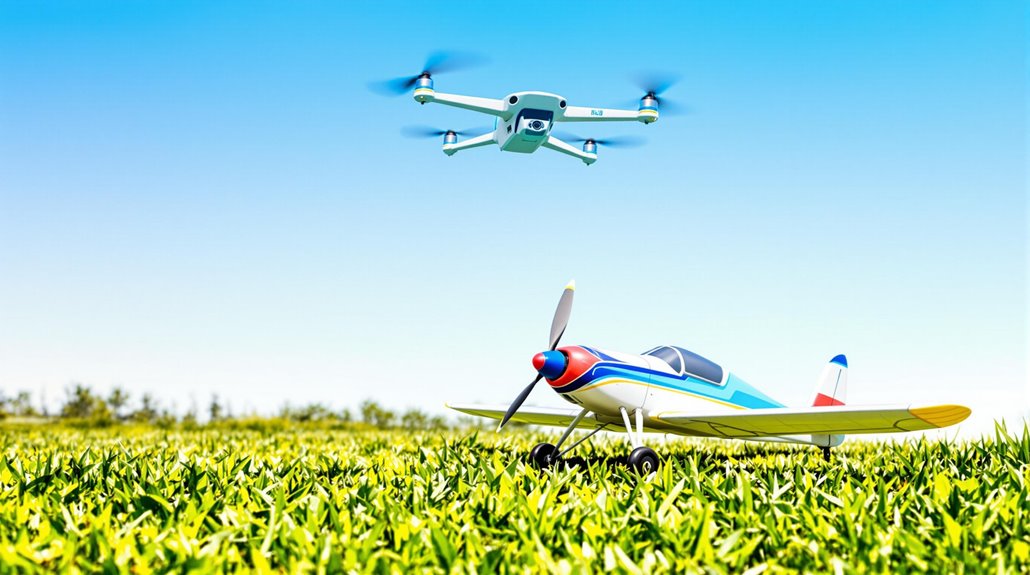
When you're choosing between a drone and an RC plane, think about what you want from the experience. Drones are user-friendly and great for beginners, perfect for aerial photography with their advanced tech. If you prefer the challenge of piloting and understanding aerodynamics, RC planes might be your best bet. They offer longer flight times and a more hands-on flying experience, but require more skill to master. Consider how much time you want to invest and what activities you're interested in. There's plenty more to explore, so you can find the right fit for your flying adventures!
Key Takeaways
- Assess your skill level; drones are beginner-friendly, while RC planes require more practice and technical understanding of flight mechanics.
- Consider the flight duration you desire; RC planes can offer longer flight times than drones, especially fuel-powered models.
- Determine the purpose of your flying; drones excel in aerial photography and innovative uses, while RC planes provide a more hands-on piloting experience.
- Evaluate your budget; entry-level drones are typically more expensive than basic RC planes, factoring in maintenance and battery costs for long-term use.
- Think about the community aspect; both drones and RC planes have active communities, but local events may differ in focus and engagement opportunities.
Overview of Drones and RC Planes
When you're deciding between a drone and an RC plane, it's essential to understand their distinct features and purposes. Drones are often equipped with advanced technology like GPS and stabilization systems, making them perfect for tasks such as aerial photography and surveying. They can fly autonomously, allowing you to focus on capturing stunning images or data rather than piloting.
On the other hand, RC planes require manual control, demanding a higher skill level from you as the pilot. You'll navigate and maintain stability through handheld transmitters, which can be more challenging, especially in windy conditions. This hands-on flying experience can be rewarding, but it does require practice and careful tuning to achieve optimal performance.
In terms of flight time, drones typically offer 10-30 minutes, while some fuel-powered RC planes can soar for up to 2 hours, depending on the model. RC planes come in various types, including powered sailplanes that are electrically powered and can perform advanced aerobatics. So, if you're looking for ease of flying and convenience, drones might be your best bet. But if you enjoy the challenge and excitement of piloting, RC planes could be the way to go. Each option serves different purposes, so consider what aligns best with your interests.
Flying Experience and Skill Levels
For many aspiring pilots, the flying experience and skill levels required for drones and RC planes can be quite different. If you're a beginner, you might find drones more appealing due to their user-friendly features. Drones often come with GPS stabilization and auto-functions, making them easier to operate than RC planes, which demand a deeper understanding of flight dynamics and manual adjustments. Flying RC planes requires continuous signal transmission, which is essential for operation and prevents crashes or collisions. Here are some points to consider when evaluating your flying experience:
- Ease of Use: Drones generally require less continuous control, which is great for novices.
- Skill Development: Flying RC planes enhances overall piloting skills and understanding of aerodynamics.
- Learning Curve: Drones offer a gentler learning curve compared to the steeper one for RC planes.
- Emergency Handling: While drones automate many functions, this can lead to challenges in emergency scenarios for beginners.
- Practice Required: Mastering RC planes necessitates more dedication and practice to achieve proficiency.
Ultimately, your choice may depend on how quickly you want to gain piloting skills and your willingness to engage with the complexities of flight dynamics.
Control Mechanisms and Operation
Navigating the skies with drones and RC planes involves distinct control mechanisms that cater to different skill levels. Drones utilize electronic flight controllers, which enable automatic navigation and stability, making them easier to fly, especially for beginners. These devices often come equipped with GPS and inertial sensors, enhancing their autonomous flight capabilities and allowing features like return-to-home and auto-landing. In contrast, RC planes rely solely on pilot input for maneuvering through control surfaces, demanding constant attention and skillful handling.
The flight control system in drones adjusts motor speeds based on your commands, which facilitates smoother flying experiences. On the other hand, flying an RC plane requires direct manipulation of multiple control sticks, adding complexity to your piloting experience. Advanced quadcopters, a popular type of drone, benefit from greater stability due to their multiple rotors, making them more suitable for first-time flyers. In comparison, the traditional RC planes present more challenging flight dynamics, requiring a higher skill level to maintain control and stability.
Ultimately, your choice will depend on your comfort with these control mechanisms and your desire for either ease or challenge in flying. A significant factor to consider is the type of wings on an RC plane, as it greatly affects the aircraft's stability and influences the learning curve for beginners.
Flight Range and Duration
Understanding the differences in control mechanisms naturally leads to considering another key aspect: flight range and duration. When you're deciding between drones and RC planes, you'll want to think about how far and how long you can fly each option.
Here's what you should know:
- Flight Range: Drones often boast impressive ranges, reaching several miles depending on the model and conditions.
- Flight Duration: Drones generally fly for 10 to 30 minutes, with top models hitting up to 50 minutes on a single charge.
- RC Planes: Fuel-powered models provide 10 to 15 minutes of flight, while electric ones may only last 5 to 10 minutes.
- High-Performance Options: Some advanced RC planes, like the Great Plane Cap 232, can soar for up to 2 hours in ideal conditions.
- Battery Life: Drones typically offer more consistent battery life, while different types of RC planes may need frequent recharging.
- For teenagers interested in recreational flying, top rated RC drones offer a balance of control and flight duration, making them a popular choice.
Stability and Maneuverability
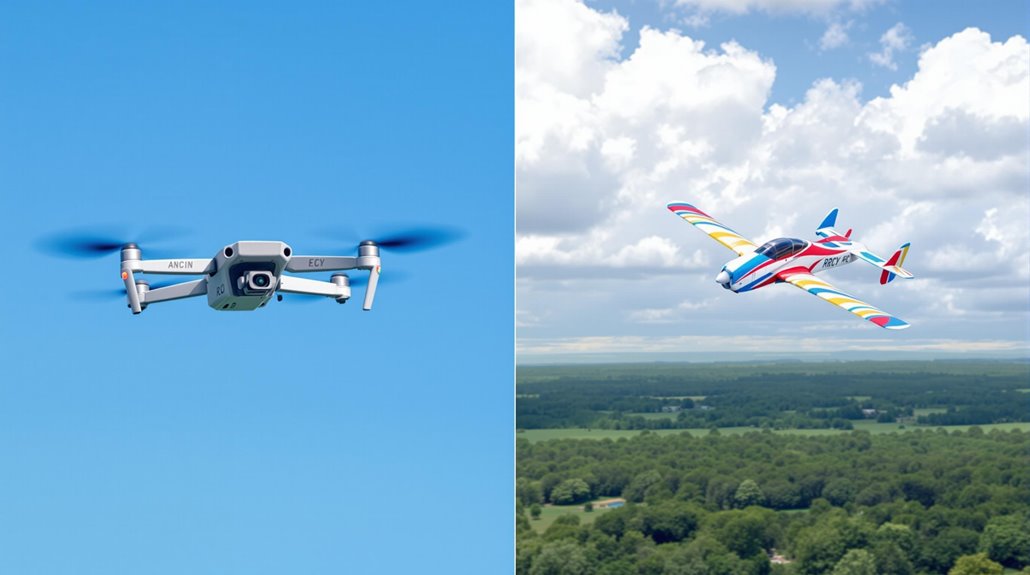
When it comes to stability and maneuverability, drones and RC planes offer distinct advantages and challenges. Drones typically excel in stability thanks to advanced stabilization systems that use GPS and inertial sensors, making them particularly steady in windy conditions. However, their smaller wing surface area can make them less stable in turbulent air, so regular calibration and maintenance are essential. On the other hand, RC planes come with longer wingspans, which provide better wind tolerance and stability across various weather conditions. Yet, this added stability requires active piloting to maintain, meaning you'll need to be more engaged when flying.
When it comes to maneuverability, RC planes shine, allowing skilled pilots to perform intricate aerobatics that drones struggle with due to their automated flying assistance. If you're an experienced pilot, you can navigate RC planes with finesse, achieving superior agility. However, novice drone operators might find themselves relying on automated systems, which can hinder emergency handling.
Ultimately, your choice will depend on whether you prioritize the stability of drones or the maneuverability of RC planes in your flying experience. Additionally, electric models of RC planes are recommended for beginners due to ease of use and minimal maintenance, making them an excellent choice for those new to piloting.
Applications and Use Cases
Both drones and RC planes cater to different needs and preferences in the world of remote-controlled flying. When it comes to applications, each has its strengths. Drones excel in versatility and are ideal for tasks like aerial photography, surveying, and even emergency response. Their GPS and stabilization technology provide incredible functionality, making them suitable for industries like agriculture and logistics.
On the other hand, RC planes are perfect for hobbyists focused on recreational flying. They prioritize piloting skills and can achieve impressive flight times—some models fly up to 2 hours, giving you longer enjoyment in the air.
Here are some key applications to consider:
- Aerial Photography: Drones capture stunning images from unique perspectives.
- Surveying: Drones assess land and construction sites efficiently.
- Agriculture: Drones monitor crops, enhancing productivity.
- Recreational Flying: RC planes provide a fun way to develop flying skills.
- Racing Events: Drones often outperform in speed and maneuverability.
Additionally, drones are being used for innovative purposes like aerial light shows, providing eco-friendly alternatives to traditional fireworks.
Ultimately, whether you lean toward drones or RC planes will depend on your specific interests and how you want to engage with unmanned aircraft.
Cost Considerations
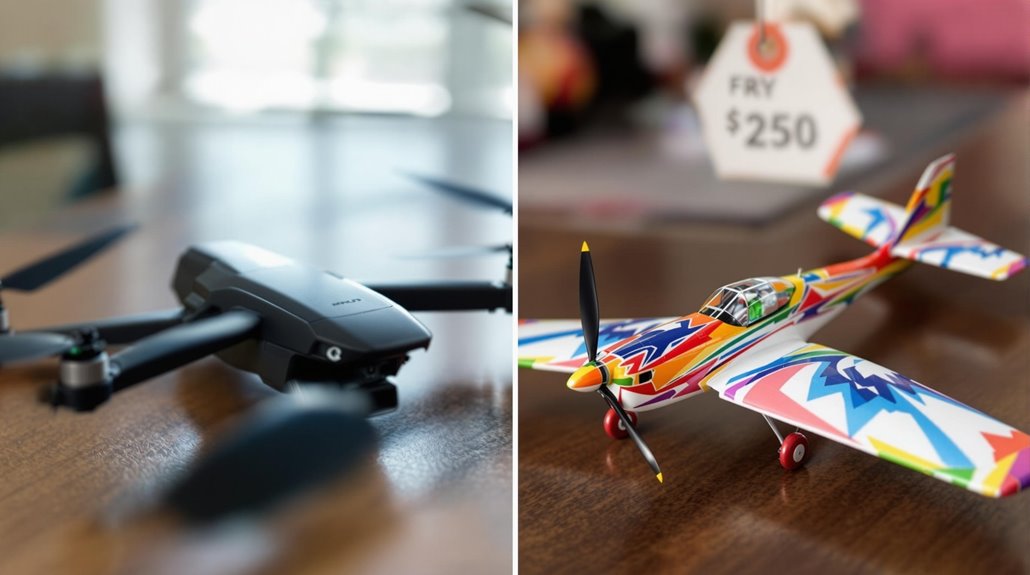
Cost plays a crucial role in your decision between drones and RC planes. When you compare the initial purchase price, you'll notice that drones tend to have higher price points. Entry-level drones start around $300, while you can find affordable RC planes available for as little as $50 to $150. This key difference between drones may influence your choice, especially if you're on a tight budget.
Don't forget about long-term costs, either. Drones might require maintenance, replacement batteries, and repairs due to their advanced features, which can add up over time. On the other hand, RC planes usually have simpler mechanics, leading to lower ongoing costs. For example, high-end RC planes like the Great Plane Cap 232 can fly for up to 2 hours, offering more value in terms of flight duration compared to drones that typically last 10-30 minutes per flight.
Be sure to consider accessories as well. Drones often need add-ons like extra batteries and propeller guards, which can significantly increase overall expenses. Weighing these cost considerations will help you make an informed choice between drones vs RC planes. Additionally, choosing the right power source selection for your RC plane or drone can impact both performance and cost, with options like electric batteries offering a more eco-friendly and low-maintenance alternative.
Community and Enthusiast Engagement
Engaging with the vibrant communities of drone and RC plane enthusiasts can significantly enhance your flying experience. These communities are rich with knowledge and camaraderie, offering you opportunities to connect with others who share your passion. By participating in local clubs, events, and competitions, you can improve your skills and enjoy flying even more. Joining these communities not only enhances social interactions but also allows you to take part in aerobatics challenges that promote camaraderie and offer social opportunities to meet like-minded individuals. Here are some ways to get involved and benefit from the community:
- Join online forums: Platforms like MavicPilots have millions of unique visitors, providing a wealth of discussions and resources.
- Attend local events: Participate in competitions and showcases to learn from experienced pilots and demonstrate your skills.
- Collaborate on projects: Work with fellow enthusiasts on building or modifying drones and RC planes.
- Seek mentorship: Find experienced pilots willing to guide you, especially if you're a beginner navigating the complexities of flying.
- Engage in group flying: Join others for collective flying sessions, fostering a sense of community and teamwork.

